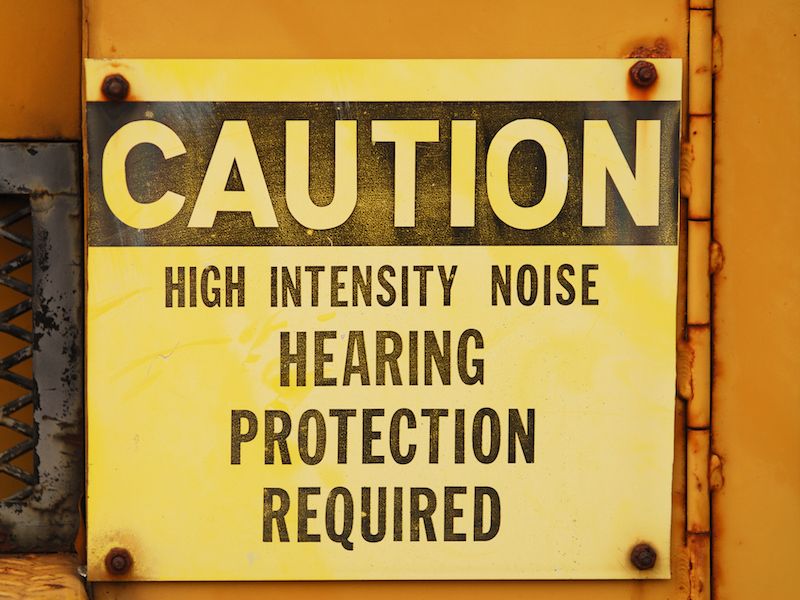
It’s one thing to recognize that you need to protect your ears. It’s another matter to know when to safeguard your hearing. It’s not as simple as, for example, determining when to use sunblock. (Is the sun out and are you going to be outside? Then you need sunblock.) It isn’t even as easy as recognizing when to use eye protection (Handling hazardous chemicals? Doing some construction? You need to wear eye protection).
With regards to when to wear hearing protection, there seems to be a huge grey area which can be dangerous. Unless we have particular information that some activity or place is hazardous we tend to take the easy road which is to avoid the issue altogether.
Evaluating The Risks
In general, we’re not very good at assessing risk, especially when it comes to something as intangible as permanent hearing damage or hearing loss. To prove the point, check out some examples:
- A very loud rock concert is attended by person A. The concert lasts about 3 hours.
- Person B has a landscaping business. She spends a significant amount of time mowing lawns, then goes home to a quiet house and reads a book.
- Person C works in an office.
You might think that person A (let’s call her Ann, to be a little less clinical) may be in more hearing danger. For the majority of the next day, her ears will still be screeching from the loud performance. It seems fair to presume that Ann’s activity was quite risky.
Person B (let’s call her Betty), on the other hand, is subjected to less noise. There’s no ringing in her ears. So it must be less hazardous for her hearing, right? Not necessarily. Because Betty is mowing all day. In reality, the damage accumulates a little at a time despite the fact that they don’t ring out. Even moderate sounds, if experienced with enough frequency, can injury your hearing.
What’s occurring with person C (let’s call her Chris) is even tougher to sort out. Lawnmowers have instructions that indicate the risks of persistent exposure to noise. But even though Chris works in a quiet office, she has a really noisy, hour-long commute every day through the city. Also, while she works at her desk all day, she listens to her music through earbuds. Does she need to give some thought to protection?
When You Should be Concerned About Safeguarding Your Hearing
The standard guideline is that if you have to raise your voice in order to be heard, your surroundings are loud enough to do injure to your ears. And you really should consider wearing earplugs or earmuffs if your surroundings are that loud.
If you want to think about this a bit more clinically, you need to use 85dB as your limit. Sounds above 85dB have the ability, over time, to lead to damage, so in those situation, you should think about using hearing protection.
Your ears don’t have a built-in sound level meter to warn you when you reach that 85dB level, so most hearing specialists recommend obtaining specialized apps for your phone. These apps can tell you when the ambient noise is getting close to a hazardous level, and you can take suitable steps.
A Few Examples
Your phone may not be with you wherever you go even if you do download the app. So we might establish a good baseline with a few examples of when to protect our hearing. Here we go:
- Every day Chores: We already talked about how something as straightforward as mowing the lawn, when done frequently, can necessitate hearing protection. Chores, such as mowing, are most likely something you don’t even think about, but they can result in hearing damage.
- Driving & Commuting: Spending all day as an Uber or Lyft driver? Or maybe you’re just hanging out downtown for work or boarding the train. The noise of living in a city is bad enough for your hearing, not to mention the extra damage caused by cranking up your music to drown out the city noise.
- Operating Power Tools: You know that working all day at your factory job is going to require hearing protection. But how about the enthusiast building in his garage? Most hearing professionals will recommend you wear hearing protection when operating power tools, even if it’s only on a hobbyist level.
- Listening to music with earbuds. This one requires caution, not protection. Whether your music is playing directly into your ears, how loud it is playing, and how long you’re listening to it are all things you need to pay attention to. Consider using headphones that cancel out outside noise so you don’t need to crank up the sound to dangerous levels.
- Exercise: Your morning spin class is a great example. Or even your evening Pilates session? All of these examples may call for hearing protection. The high volume from instructors who play loud music and microphones for motivation, though it might be good for your heart rate, can be bad for your ears.
A strong baseline may be established by these examples. When in doubt, however, you should defer to protection. In the majority of cases, it’s better to over-protect your ears than to leave them exposed to possible damage down the road. If you want to be able to hear tomorrow, protect today.
